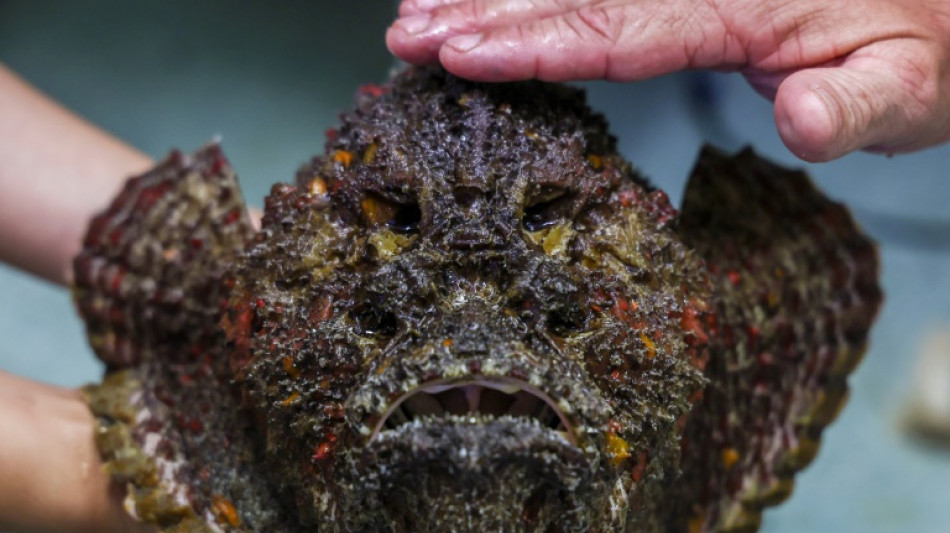
-
 Chile police arrest suspect over deadly wildfires
Chile police arrest suspect over deadly wildfires
-
Djokovic eases into Melbourne third round - with help from a tree

-
 Keys draws on champion mindset to make Australian Open third round
Keys draws on champion mindset to make Australian Open third round
-
Knicks halt losing streak with record 120-66 thrashing of Nets

-
 Philippine President Marcos hit with impeachment complaint
Philippine President Marcos hit with impeachment complaint
-
Trump to unveil 'Board of Peace' at Davos after Greenland backtrack

-
 Bitter-sweet as Pegula crushes doubles partner at Australian Open
Bitter-sweet as Pegula crushes doubles partner at Australian Open
-
Hong Kong starts security trial of Tiananmen vigil organisers

-
 Keys into Melbourne third round with Sinner, Djokovic primed
Keys into Melbourne third round with Sinner, Djokovic primed
-
Bangladesh launches campaigns for first post-Hasina polls

-
 Stocks track Wall St rally as Trump cools tariff threats in Davos
Stocks track Wall St rally as Trump cools tariff threats in Davos
-
South Korea's economy grew just 1% in 2025, lowest in five years

-
 Snowboard champ Hirano suffers fractures ahead of Olympics
Snowboard champ Hirano suffers fractures ahead of Olympics
-
'They poisoned us': grappling with deadly impact of nuclear testing

-
 Keys blows hot and cold before making Australian Open third round
Keys blows hot and cold before making Australian Open third round
-
Philippine journalist found guilty of terror financing

-
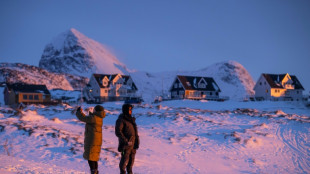 Greenlanders doubtful over Trump resolution
Greenlanders doubtful over Trump resolution
-
Real Madrid top football rich list as Liverpool surge

-
 'One Battle After Another,' 'Sinners' tipped to top Oscar noms
'One Battle After Another,' 'Sinners' tipped to top Oscar noms
-
Higher heating costs add to US affordability crunch

-
 Eight stadiums to host 2027 Rugby World Cup matches in Australia
Eight stadiums to host 2027 Rugby World Cup matches in Australia
-
Plastics everywhere, and the myth that made it possible
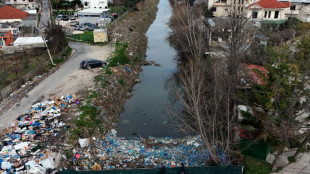
-
 Interim Venezuela leader to visit US
Interim Venezuela leader to visit US
-
Australia holds day of mourning for Bondi Beach shooting victims

-
 Liverpool cruise as Bayern reach Champions League last 16
Liverpool cruise as Bayern reach Champions League last 16
-
Fermin Lopez brace leads Barca to win at Slavia Prague

-
 Newcastle pounce on PSV errors to boost Champions League last-16 bid
Newcastle pounce on PSV errors to boost Champions League last-16 bid
-
Fermin Lopez brace hands Barca win at Slavia Prague

-
 Kane double fires Bayern into Champions League last 16
Kane double fires Bayern into Champions League last 16
-
Newcastle pounce on PSV errors to close in on Champions League last 16

-
 In Davos speech, Trump repeatedly refers to Greenland as 'Iceland'
In Davos speech, Trump repeatedly refers to Greenland as 'Iceland'
-
Liverpool see off Marseille to close on Champions League last 16

-
 Caicedo strikes late as Chelsea end Pafos resistance
Caicedo strikes late as Chelsea end Pafos resistance
-
US Republicans begin push to hold Clintons in contempt over Epstein

-
 Trump says agreed 'framework' for US deal over Greenland
Trump says agreed 'framework' for US deal over Greenland
-
Algeria's Zidane and Belghali banned over Nigeria AFCON scuffle

-
 Iran says 3,117 killed during protests, activists fear 'far higher' toll
Iran says 3,117 killed during protests, activists fear 'far higher' toll
-
Atletico frustrated in Champions League draw at Galatasaray

-
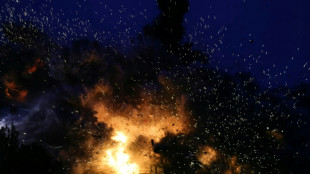 Israel says struck Syria-Lebanon border crossings used by Hezbollah
Israel says struck Syria-Lebanon border crossings used by Hezbollah
-
Snapchat settles to avoid social media addiction trial

-
 'Extreme cold': Winter storm forecast to slam huge expanse of US
'Extreme cold': Winter storm forecast to slam huge expanse of US
-
Jonathan Anderson reimagines aristocrats in second Dior Homme collection

-
 Former England rugby captain George to retire in 2027
Former England rugby captain George to retire in 2027
-
Israel launches wave of fresh strikes on Lebanon
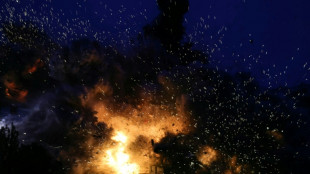
-
 Ubisoft unveils details of big restructuring bet
Ubisoft unveils details of big restructuring bet
-
Abhishek fireworks help India beat New Zealand in T20 opener

-
 Huge lines, laughs and gasps as Trump lectures Davos elite
Huge lines, laughs and gasps as Trump lectures Davos elite
-
Trump rules out 'force' against Greenland but demands talks

-
 Stocks steadier as Trump rules out force to take Greenland
Stocks steadier as Trump rules out force to take Greenland
-
World's oldest cave art discovered in Indonesia


Milking venom from Australia's deadly marine animals
Imagine feeling like an elephant is sitting on your chest, you can't breathe, there's a sense of impending doom and the pain is so intense you want to die.
You've just been stung by a tiny Irukandji jellyfish.
While you are unlikely to die, toxicologist Jamie Seymour of James Cook University in Australia says you'll wish you had.
He should know -- he's been stung 11 times.
But Seymour's job is riskier than most: milking sea creatures of their venom to create life-saving antivenoms.
Dozens of Irukandji jellyfish, some no bigger than a sesame seed, float in tanks inside a metal shed kept by the university in the state of Queensland.
In another tank, there are the most venomous fish in the world: the stonefish.
If its spines pierce your skin, the pain will cause you to lose consciousness and the area around the wound will turn black and die.
The stonefish's venom is powerful enough to kill humans, but there have been no recorded fatalities in Australia. Seymour is also among those who have survived its sting.
His team is studying Australia's deadliest marine animals in a bid to understand them and keep people safe.
"Australia is without a doubt the most venomous continent in the world," Seymour told AFP.
"When you talk to people, especially Americans, they're surprised that we don't all die at birth."
As Seymour moves around the tanks, he points out other deadly animals, including a box jellyfish which can kill a person within 10 minutes with its poison.
- Stings and bites -
Despite the countless venomous animals across Australia, fatalities are relatively rare.
The latest official data show that between 2001 and 2017, there were an average of 32 animal-related deaths a year, with horses and cows the biggest killers.
Since 1883, there have been only two recorded deaths from Irukandji jellyfish and about 70 deaths from box jellyfish.
By comparison, there were about 4,700 deaths from drug, alcohol and vehicle-related incidents in Australia in 2022 alone, according to government data.
"So, the chances of you being stung by an animal in Australia -- or bitten -- is reasonable, but the chances of dying very small," Seymour said.
His facility is the only one that milks venom from these deadly marine animals and turns it into antivenom.
For the deadly box jellyfish, that process is tricky. Researchers must remove their tentacles, freeze-dry them and collect the venom once it solidifies.
There's no antivenom for the Irukandji jellyfish.
Instead, doctors treat each symptom as it appears. If you get rapid medical advice, the chance of survival is high.
For the stonefish, the venom extraction process is more challenging.
Researchers insert a syringe into a live fish's venom glands, holding it with a towel while they withdraw a thimble full of the deadly fluid.
They then send the venom to a facility in the state of Victoria which processes it into life-saving antivenom.
First, the facility staff inject a small amount of venom over six months into an animal, such as a horse, which produces natural antibodies.
The animal's plasma is later removed and the antibodies are extracted, purified and reduced into an antivenom for humans.
- Deadly jellies -
Antivenoms are shipped to hospitals around Australia and some Pacific islands, where they can be administered if someone is stung or bitten by an animal.
"We have some of the best antivenoms in the world, there is no doubt about that," Seymour told AFP, noting the time and effort put into producing the serums in Australia.
And antivenom may be increasingly needed, as climate change can raise the risk of a sting, according to scientists.
About 60 years ago, the Irukandji jellyfish stinging season in Australia was in November and December.
With ocean temperatures staying warmer for longer, now the jellyfish can linger as late as March.
Warming oceans are also pushing these deadly sea jellies -- and other marine animals -- further south along the Australian coast.
Seymour's students have found that temperature changes can also alter the toxicity of venom.
"For example, if I make an antivenom for an animal at 20 degrees and I get bitten by an animal that lives in the wild at 30 degrees, that antivenom isn't going to work," he said.
Studies have also shown that venom from stinging creatures could be used to treat myriad health conditions, including one in which rheumatoid arthritis was effectively cured in mice in two weeks.
But this area of research remains largely unfunded, and Seymour says his work continues.
"When you think of the venom, think of it like a vegetable stew. There's a whole heap of different components that are in there," he said.
"What we've been trying to do is pull these things apart and work out what's going on."
R.Fischer--VB



